by
Jan 23, 2024 |
Kelsey Underwood
The Watson Fellowship Program recognizes future educators and researchers for their contributions to scientific advancement of the turfgrass industry
Lawrence, Kan. (Jan. 23, 2024) – Emily Braithwaite and Daniele McFadden are the 2023 Dr. James Watson Fellows from the Golf Course Superintendents Association of America (GCSAA), and each will receive a $5,000 scholarship. The Watson Fellowship is supported by The Toro Company and is administered by the GCSAA Foundation, the philanthropic organization of GCSAA.
The Watson Fellowship, started in 1998, is named in honor of the late James R. Watson, Ph.D., a pioneer and visionary in turfgrass research and vice president at The Toro Company. The fellowship recognizes students in postgraduate degree programs who have been identified as scientists that will go on to be leaders in turfgrass management.

Braithwaite is pursuing her master’s degree in turfgrass pathology from Oregon State University and received her undergraduate degree in plant science: turfgrass management, from Rutgers University. Now in the Pacific Northwest, her studies are focused on nematology, specifically damage symptoms on putting greens that are attributable to plant-parasitic nematodes (PPN). An initial objective of Braithwaite’s work is to survey cool-season golf course putting greens across Washington, Oregon and California to establish what PPN species are present and their relative abundance.

McFadden is working toward a Ph.D. in turfgrass science from Kansas State University and received both her bachelor’s and her master’s degrees from Kansas State University. Her research has focused on relevant questions involving zoysiagrass management, and her objectives include determining how cultural practices affect zoysiagrass quality, rooting and thatch accumulation; evaluating chemical control strategies used on zoysiagrass either at the time of sprigging, during winter dormancy or during bermudagrass encroachment; and evaluating new experimental zoysiagrass genotypes that have the potential to become improved cultivars in the U.S. transition zone.
“The study of turfgrass science allows for continued growth and cultivation in the golf industry,” GCSAA CEO Rhett Evans said. “Thanks to ongoing and generous support from our friends at The Toro Company, we are able to honor the steadfast efforts of Emily and Daniele in advancing the turfgrass management industry.”
Braithwaite began her undergraduate journey studying foreign language, but a summer job at Rutgers’ Center for Turfgrass Science led her down her current path. Working in the lab with diagnostic samples and being able to help superintendents solve problems on the golf course through new research into management strategies led her back to the classroom. Braithwaite’s end goal is to always provide solutions to real-world problems.
McFadden’s path to turfgrass science began at the age of 15, when she was hired at Prairie Trails Golf Course in her hometown of El Dorado, Kan. After four years at Prairie Trails, she headed to Kansas State with a passion for turfgrass science and a desire to make a difference. Her educational experience has helped her develop a love for research, and her experience in the turfgrass industry motivates her to focus her research on practical problems that golf course superintendents and sports turf managers face every day.
“Emily and Daniele have established themselves as clear leaders in turfgrass science and management,” said Josh Friell, Ph.D., Chief Research Scientist at The Toro Company. “By applying good science to key challenges, they are advancing the turfgrass industry and carrying on an important part of Dr. Watson’s legacy.”
Watson was a visionary and leading authority on turfgrass. He was vice president for customer relations and chief agronomist for The Toro Company. Dr. Watson was passionate about educating and developing the next generation of turf scientists, which was a key reason for the establishment of this fellowship.
Dr. Watson’s leadership and contribution was recognized in many ways. He was the winner of the USGA Green Section Award in 1976 and the 1977 Agronomic Service Award by the American Society of Agronomy, Watson was named a Fellow of the American Society of Agronomy and the Crop Science Society of America in 1979. He also won the 1991 Harry Gill Memorial Award from the Sports Turf Managers Association; the Old Tom Morris Award, a special GCSAA honor, in 1995; and the Donald Rossi Award from the Golf Course Builders Association of America (GCBAA).
Over the course of five decades at Toro, Watson collaborated with the scientific community and customers, and conducted research on water conservation, the adaptability of turfgrasses, fertilization practices, snow mold prevention techniques for the winter protection of turfgrasses, and more. He authored more than 400 articles on turfgrass management.